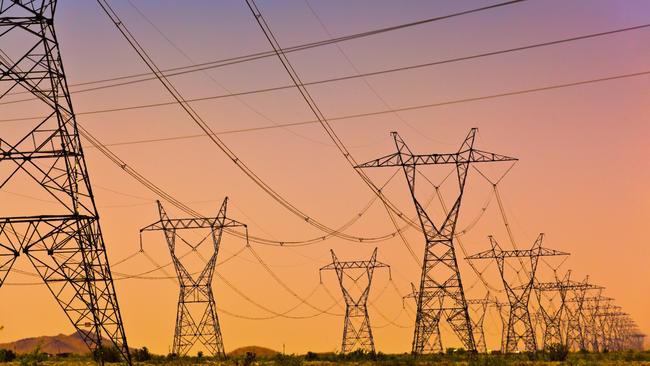The Northern Territory needs to develop a more sensible energy policy, writes Matt Cunningham
THE government can continue to hurtle towards its renewable energy target but it would want to hope the lights stay on

Opinion
Don't miss out on the headlines from Opinion. Followed categories will be added to My News.
- THERE’S an election on. Get ready for some bullsh*t
- THE Top End is a paradise ... but we need to make it even better
- A CHANGE of leader may be just what the CLP needs
THE October blackout in Alice Springs has raised serious questions about the Territory’s energy policy.
While politicians sought scapegoats and pointed fingers — “look over here, look over there, look anywhere but at the clouds” — reports into the blackout raise serious questions about the NT’s 50 per cent renewable energy target by 2030.
As the Utilities Commission noted:
“(The blackout) is further evidence that the current systems (including Darwin/Katherine and Tennant Creek) may not be agile and robust enough to support an early transition towards the Territory Government’s 50 per cent renewables by 2030 target.
“Management of system security and reliability becomes more complex as increased amounts of asynchronous generation (solar in the case of the Territory) is added to the systems and, in the case of rooftop solar, electricity current flows become bi-directional.
“The risk and cost of getting settings wrong increases and care and time needs to be taken to get it right and minimise the costs of the transition. Consumers place a very high value on system reliability and security.”

The problem with the Territory’s renewable energy target is that it’s been planned about as well as a Willem Westra Van Holthe leadership coup.
It was plucked off a shelf ahead of the last election, like a lot of other Labor policies borrowed directly from other states. But it failed to consider the unique circumstances of the NT.
For a start, the NT’s electricity supply — coming from gas rather than coal — was already responsible for a far smaller percentage of total emissions than in other states.
Second, our infrastructure was still suffering from decades of neglect that had been revealed in the Reeves Report of 2009 following widespread blackouts in Darwin. Adding more renewables was going to be a harder task here than elsewhere without massive infrastructure investment.
But also, our energy needs had already been paid for until well beyond 2030.
MORE FROM MATT CUNNINGHAM
WHO do you trust in an election campaign? Not the pollies
THERE’S no fixing our financial mess without genuine public service reform
IF you don’t pay for news, you’ll be left with the ABC
In fact if anyone had taken the time to properly develop this strategy, they would never have chosen the year 2030 to hit this target. Back in 2009, Labor Chief Minister Paul Henderson signed the NT up to the deal of a lifetime for gas to fuel our domestic energy supply for the next 25 years.
That gas was purchased from ENI’s Blacktip field for $4 billion with the contract running until 2034.
The amount we pay for that gas is the same, regardless of how much we use.
We can sell the excess to third parties, but this has proved a difficult task, particularly with plans to turn Darwin into a gas manufacturing hub stalling.
So as we add more renewables, we are not saving any money by using less gas. In fact, we’re running our government-owned power generation company out of business.
Just before Christmas two years ago the NT Government announced it had sacked the board of Territory Generation following tensions over the renewable energy target.
T-Gen had been forced to write down about a third of its value - about $150 million - and needed a $30 million government injection to stay afloat.
MORE FROM MATT CUNNINGHAM
THE Commonweatlh doesn’t seem to see the need for a strong and prosperous NT
GOVERNMENT’S reliance on spin doctors shows contempt for its constituents
ROYAL Commission left the Gunner Government an impossible mission
The government prevented T-Gen from diversifying into solar but the company was still tasked with ensuring reliability through gas-and-diesel-fired electricity - a task made more difficult and more expensive as more renewables were added to the mix.
Our electricity supply is effectively being privatised by stealth - an odd move for a Government so opposed to the sale of public utilities.
Some are now predicting our energy situation could reach a critical tipping point next year. The new ENI-owned Katherine Solar Farm will inject another 25MW into the grid.
The government-owned Jacana Energy has already agreed to purchase from ENI all of the power from the Katherine Solar Farm; power that will replace the ENI gas that we’ve already paid for.
There is also a rapid rise in the uptake of solar in businesses and homes, helped by grants and the nation’s highest feed-in tariffs; a kind of reverse socialism that ensures the wealthiest in our community - those who can afford to buy a house and pay to put solar panels on the roof - pay next-to-nothing for their power, while battling renters pay full bottle.
This extra solar - and its less predictable supply - is reducing reliability in a grid that hasn’t been sufficiently upgraded to deal with it. It’s a complex subject to understand or explain, but a Power and Water manager puts it like this:
“When it comes to electrical generation – think of water trickling into a bucket with holes in it and as water goes in, water is leaking out of holes in the bucket keeping the level the same. If you run it dry or overflow it then the result is chaos.
“Too much electrical generation can’t be stockpiled or stored anywhere and literally needs a place to go, which requires generators to be backed off to crucial low levels and results in partial black outs to the network.
“Likewise, too much unplanned consumption eats up the very, very small (spinning) reserves in the supply. Either way – get it just a bit wrong and you have computer-controlled generators scramble their own brains and turn themselves off to protect from overload.
“When one generation feeder goes off, that loads up another one which also trips out the next and the next and so on until it’s lights out across the town.”
The Alice Springs situation made clear that the government hasn’t done the required planning - or made the sufficient investments - to ensure the grid can handle the increased renewable energy.
A leaked report this week also showed staff at Power and Water are not adequately trained to deal with these changes.
Meanwhile ministers have been suspiciously quiet about what future work is planned to upgrade the grid, how much it will cost, and whether this will result in higher prices for consumers.
None of this is to suggest we shouldn’t be pursuing a cleaner energy future.
You only had to walk outside this week to understand climate change is an issue the world needs to deal with.
Advancing technology in battery and hydrogen storage could mean the issues with renewable reliability can be mitigated in the future.
But blazing forward with no real plan seems a recipe for disaster. From here there are two options.
The government can continue to hurtle towards its renewable energy target, putting at risk the reliability of electricity supply and further damage to its already disastrous budget situation. This might even be a successful political move, painting its opposition as climate-change deniers not committed to lowering emissions.
It just needs to hope the lights stay on until after next August’s election.
Or, it can use the Alice Springs experience as a warning, take stock and develop a more sensible energy policy.
One that matches the long-term need for emissions reductions with economic


